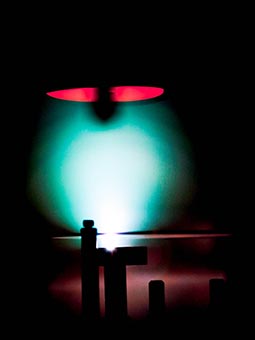Center for Predictive Simulation
of Functional Materials
Research
 Today, the design of functional materials is greatly hindered by the limited predictive power of established quantum mechanics-based approaches. The strong coupling between charge, spin, orbital, and lattice degrees of freedom that results in desired functionalities also challenges conventional modeling approaches. For example, functionals for density functional theory calculations are used empirically in practice, while extant quantum many-body approaches do not offer the capabilities, accuracy, and general applicability that is desired.
Today, the design of functional materials is greatly hindered by the limited predictive power of established quantum mechanics-based approaches. The strong coupling between charge, spin, orbital, and lattice degrees of freedom that results in desired functionalities also challenges conventional modeling approaches. For example, functionals for density functional theory calculations are used empirically in practice, while extant quantum many-body approaches do not offer the capabilities, accuracy, and general applicability that is desired.
The Center develops robust, convergent, and generally applicable electronic structure methods that properly and predictively capture the physics of functional materials. We will take advantage of recent developments in parameter free Quantum Monte Carlo (QMC) to achieve this goal. These methods will take advantage of today's petascale and tomorrow's exascale supercomputers, and strongly complement today's more empirical approaches.
In order to develop a truly predictive and validated framework, the Center will focus on functional materials which possess a wide spectrum of properties, including magnetism, charge ordering, metal-insulator transitions, and large band gap variation. Extensive validation work will be performed using pulsed laser deposition and oxide molecular beam epitaxy-grown samples. The Center will make full use of modern characterization techniques available at DOE User Facilities including neutron scattering, soft and hard x-rays, and high-resolution electron microscopy for imaging and spectroscopy. This will provide a stringent and timely validation of the newly developed methods as well as provide a rich area for identifying new functionalities for energy-related technologies.